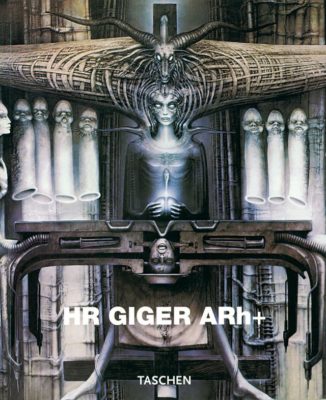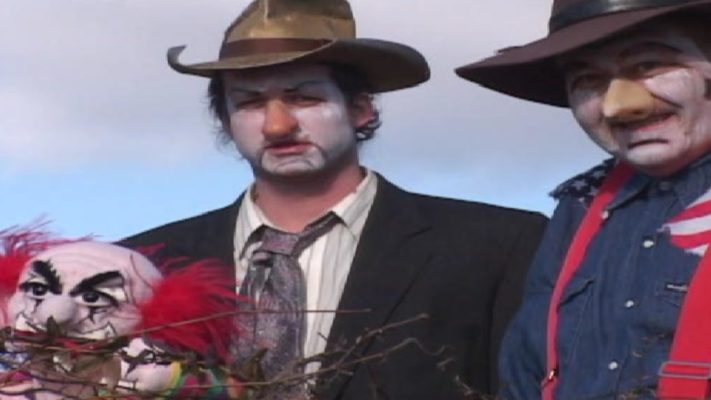This Taschen artbook explores the work of Hans-Ruedi Giger, who died not long ago. It’s fairly large (23cm*30cm), the print quality is fine, the binding in my copy was falling apart, and Timothy Leary’s foreword is scarier than the actual book. “[Giger] has obviously activated circuits of his brain that govern the unicellular politics within our bodies, our botanical technologies, our aminoacid machines” etc. Yikes.
Why Giger? He was special. Like Hieronymous Bosch, William Blake, and Junji Ito, he saw worlds that nobody else could see. He worked in a lot of mediums but is most famous for his airbrushed “biomechanicals”: totemic, terrifying creatures with dripping teeth, corrugated hides, and electrophosphorescent eyes. They’re an impossible mixture of life and not-life, future and past, sterility and dirt; ancient Egyptian gods built on a Soviet assembly line. There’s little else like them: no artist has ever copied Giger’s signature style with much fidelity. You might say that biomechanicals are more commonly found in reality than in art.
Despite some avant-garde leanings, he was a commercial artist through and through – even after “Giger-mania” took hold in the 70s he wasn’t above decorating heavy metal sleeves, or PC game box art, or guitars, or mic stands, or lager bars. His art showed you unexpected things, and could also be found in unexpected places.
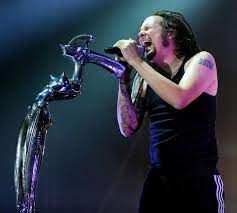
Metal was one of Giger’s favorite subjects. So was flesh, and the ways one can be enhanced or diminished by the other. In the typical Giger image pipes coil and mutate, becoming snakes and phalluses, and glistening shafts and struts pierce necrotic blue-black skin. Giger didn’t predict the future. He grew up in an age of titanium hips, electrical pacemakers, and so on: men have altered their bodies through mechanical means for a long time. Giger’s insight was to tease out the aesthetic power of this union. His creepy-crawly arc-welds of the biologic to the anodic are overwhelming and hit the eye like a bomb. They’re almost too ugly to look at. Or too beautiful. His greatest works actually manage to be both at the same time.
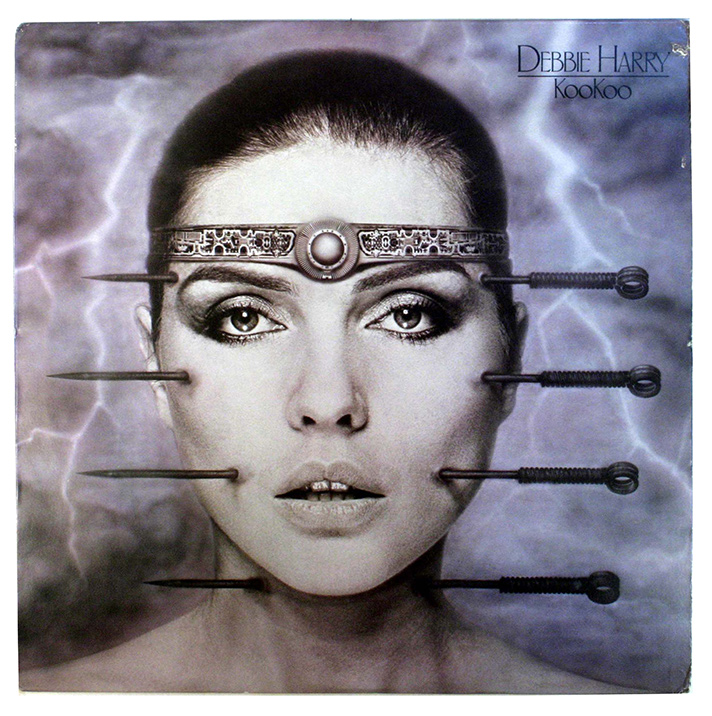
But there’s no sense of gore or mutilation to Giger’s art. He weaves metal through soft tissue and keratin and bone in a way that looks natural, as though evolution rather than surgery produced his creatures. There’s also no motion: Giger’s art has a stillness that’s striking: the “biomechanics” don’t even seem capable of movement. The creature he designed for Ridley Scott’s Alien became a horror movie monster that scampers and leaps around, but there’s none of that in his original artwork, no impression that it might be ready to impale a blood funnel into your chest. It looks petrified in place, a stone god of a stone universe. An advantage of fantasy is that you can create a world that plays to your strengths as an artist, and though Giger never had much talent for evoking movement, he could imagine a place were movement doesn’t happen. His creations are like heavy machines in a factory: bolted into the floor and never moved again. They look perfectly at ease within the environments he creates for them.
The autobiographical text – written by Giger – proves less interesting than the pictures. He doesn’t want to talk about himself, which I submit is a disadvantage when writing an autobiography. He grew up in 1940s Graubünden, lived a childhood so uneventful it’s a miracle he didn’t perish from boredom, worked in advertising, and so on. His father wanted him to become a pharmacist, but he had a dream, maaan. Giger focuses on the dullest details possible, and we never really understand what formed him as an artist. This continues in later passages, where he relates his rise to fame (which reached its peak in 1979, when Alien won him an Oscar for Best Achievement in Visual Effects). Occasionally there are oblique suggestions of personal trouble. “…after the PR commotion and stress”…what stress? “My inner despondency…” What despondency? Giger’s biography fails a basic test: it’s less vivid and informative than reading his own Wikipedia article.
I know someone who attended a Pink Floyd exhibit in Milan – one clearly curated by Roger Waters or someone, because it whitewashed away any controversy, reimagining Pink Floyd as a band of great mates who got on a treat and made awesome music together. The problem (aside from dishonesty) is that the Pink Floyd story is incomprehensible if you don’t talk about the bad stuff – Syd’s mental collapse, Waters’ disillusionment, the destructive infighting. A naif would be left standing underneath a huge sign saying “PINK FLOYD IS BACK!” and wondering “where did they go? And why are there now three people in the band photo instead of four?” Giger’s account of his own life was is a little like that. Things were clearly being left unsaid, which is a shame. I suppose the pictures are the important thing, but they needn’t be the only thing.
The Giger style lives on after him, even though he’s the only one who could really do it. Otherwordly or alien is a common adjective used to describe it, but it’s a specific cold-blooded alien aesthetic. I used to read popular astronomy books which would talk about how moons such as Europa and Enceladus might have liquid oceans, and there would always be the suggestion that we might find fish living there. This is unlikely: life requires a source of free energy, and there’s almost none in such systems. If anything did live, it would be very slow, very conservative of motion. It might communicate and reproduce through radio photons. It would shift fractions of an inch per millenia. If it could think, it would regard motion the way we regard time travel – as an absurd theoretical conceit.
In other words, they might look like HR Giger’s half-frozen monsters. Very cold. Very old. Shunning movement. Giger was the god of the formaldehyde-filled vein, the unbeating stone heart, the liquid nitrogen-cooled brain, and this book cryo-preserves a lot of his unique genius.
No Comments »
…is an episode of The Simpsons, but also an odd video.
Few have seen it. Those who have might actually understand it less than those who haven’t. Watch it and you’ll see what I mean. It’s a comprehension black hole.
Here’s the thing about the weird internet: words don’t work. The more I describe something the more confusing they become. Light doesn’t illuminate their darkness, it deepens it. Chernobyl has special radiotrophic funguses that resist radiation; the internet has special funguses that resist explanation. There’s stuff that just seems broken, barely existing in reality, and well-meaning “explainers” all seem like mathematical treatises on four-sided triangles.
Goatse.cx is a good example. Although I can tell you what it is – a long-gone website which hosted a photo called hello.jpg, showing a man stretching his anus to the width of a toilet’s outflow pipe – I can’t capture its essence.
I’d have to write reams about the surrounding culture, how it became an easy-bake recipe for trolling and griefing, how some scrub would ask for CS hacks on IRC and you’d link him to goatse.cx and laugh while imagining his face, how it then became the flashpoint for various internet dramas (the scrabble to secure the goatse.cx domain name after the Christmas Island authorities intervened, the search to identify “the goatse dude”, etc), and eventually became a shibboleth for the weird web: something you either “get” or don’t.
For many of us, goatse was a shock, a loss of virginity, the moment the safety rails fell away and we realized just how terrifying the internet was. It’s a humbling reminder that no matter how weird you think you are, you’re probably pretty normal in the grand scheme of things. But I don’t think I’m making much progress at explaining goatse. In the end, it just exists: this awful, inexplicable thing that everyone knows about but nobody talks about, a cancer the internet is slowly dying from. A few days ago, the Toronto Sun put this on their Twitter feed, and everyone went “haha” without even acknowledging what it was. That’s the correct way to experience goatse. Wordlessly.
Bart the General is a similar case. It can’t be done justice. This Youtube comment by “Fudgaboutit” sums it up.
Have you ever been scared by something as a kid because you can’t comprehend what you’re seeing, but you know something is wrong? It is so strange to be feeling that again as an adult.
It’s a deliberately bad animated The Simpsons parody created in 2005 by a UK art collective known as Famicon (most particularly, someone called GHXYK2). Their other “work” is varied: books, music, videos, comics, and homebrew PC games. Bart the General was animated in Multimedia Fusion 2, with sprites apparently drawn in MS Paint. It shares a name and nothing else with the fifth episode of The Simpson’s first season, and I assume GHXYK2 titled it that way to trick people searching for the actual episode. When viewed in a blurry 320×240 thumbnail, Bart the General kinda looks like the Simpsons.
It begins with an ear-bleeding, distorted remix of Danny Elfman’s Simpsons theme. You’ll want to mute your audio. There’s a loudness war, and this is its A-Bomb. Hallucinatory imagery flashes on the screen. Animated gifs loop in corrupt circles, distorted by digital filters. It’s an uncomfortably long introduction, but what follows is beyond uncomfortable.
An Australian convict called Toadfish shows up on the Simpsons’ street. He throws Ned Flanders out of his house, gruesomely murders Scott and Todd, and then enters the Simpson home for reasons unclear. I should note that Homer is “Omarn”, and Bart is “Burton”, but GHXYK2 occasionally refers to these characters by their original names, and so will I. Lisa is mentioned several times but never seen, and Maggie doesn’t seem to exist.
Toadfish out-alphas Homer (“Oi’ll break yorr legs!”), and seduces Marge with his antipodian charm (“thought you were the daughta, ya so fit”). He moves in, and Homer is thrown out of the house and forced to live in a crackhouse with Ned, where he cries incessantly. Even his son Bart begins to persecute him.
This has an odd air of pathos – as though the creator is taking it half-seriously. You feel sad for Homer. Generally, tragedy takes a Shakespearian form (the hero’s downfall occurs because of their mistakes or personality flaws), and a Grecian form, where the downfall is unavoidable, the will of the gods. I’d call Bart the General a Grecian tragedy. Homer hasn’t done anything wrong. Stonefish has just walked off the street into his life and taken everything from him. It’s arbitrary fate, unearned and cruel. But this is merely the polar inversion of the regular Homer Simpson.
It’s often observed (even on the show itself) that Homer makes no sense. How could a man that stupid work as a nuclear safety technician? How could a man that selfish have a loving and loyal wife and family? In its own way, it’s as mind-breakingly wrong as anything in Bart the General. Homer doesn’t deserve to lose everything. But nor does he deserve to have everything. The symmetry is fearful.
The final thirty seconds are incredible. Homer stops bewailing his fate and returns back home. Maybe he thinks that it’s all a bad dream and life can still return to normal.
But as he enters the house, he sees Marge having sex with Toadfish on the iconic brown Simpsons couch, and suffers an emotional collapse. He groans “Marge…you’re breaking my heart!” in such hard-rending gravity that you might think it’s a reference to The Room (which it probably isn’t, that film achieved fame a year after Bart the General), before sitting down and scooting his ass back and forth on the carpet, moaning like a broken vacuum cleaner.
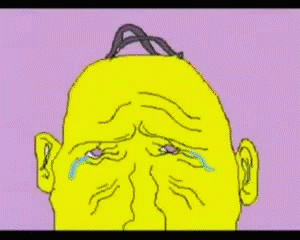
Then it ends.
Toadfish, by the way, is a character from the Australian sitcom Neighbours. This meaningless yet oddly specific detail typifies Bart the General. Why is Toadie in the Simpsons? And why is he so different to the original character? Jarrod “Toadfish” Rebecchi was a class clown who was later recast as the show’s voice of wisdom, but he was never a brutal sociopath. It does explain some creative decisions, though. For example, this digitally defaced man is Neighbours actor Ryan Moloney atop a picture of tetractenos glaber, the Australian toadfish.

The original video has gone down, but re-uploads exist. Bart the General has a hydralike tenacity. It probably has more fans than the Simpsons episode it stole a name from, which was a tepid and safe effort from a show whose writers were still gaining confidence.
GHXYK2 made three more Bart the Generals. They didn’t recreate the success of the original, and didn’t try to. Instead, they took an already-weird story even further into a landscape of nightmare.
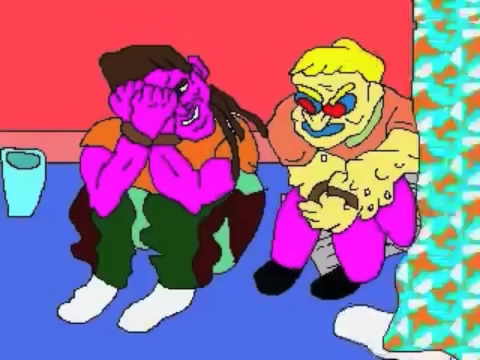
Bart’s voice completely changes. A few Simpsons characters appear (Mr Burns, Otto the busdriver), along with Dr Gregory House and still other characters I cannot identify. There are Lynchian touches – such as the entire fourth episode, which has a reddish tinge suggesting sundown, or a spiritual and perhaps actual apocalypse. Not even the length of the videos makes much sense. There are sophomoric gross-out touches, such as a plane with a shitting anus on one wing-tip.

Homer’s troubles only get worse. Toadfish’s brother Stonefish arrives at the house (“I’m fucking ruining your life from this day on!”), and joins in the bullying of Homer.
Stonefish doesn’t even look like his Neighbours character. He also possesses magical powers. One of Bart the General’s most gruesomely effectly visuals involves Stonefish electrocuting Homer and then literally pouring himself down a phone line (link because it’s possibly seizure inducing, and too annoying to have on the page).
Other subplots: Marge is pimped out by Toadfish and stars in porn videos. Bart sells these videos of his mother to buy fuel for a sports car he has purchased somehow. Dr House falls out of a plane. The Simpsons house is taken over by a gang of terrorists led by a panther-headed figure with a British accent. Bart loses his car, returns to Homer, and apologizes by performing oral sex on his father.
All of it is fairly incidental. Plot threads just begin and end, usually unresolved. But you see the cracked remnants of TV plotting. The terrorists (who kill someone, leave, and are never seen again) are your classic villains-of-the-week, for example. And Stonefish is the “worse bad guy appears after hero defeats the first bad guy” season 2 plot device. The fact that it’s all wrong – Homer hasn’t even defeated the first bad guy, and Stonefish and Toadfish join forces! – make it all the funnier.
It seems different artists created different parts: as they vary a lot in style, quality, and tone. Will there be a Bart the General 5? Time will tell. The fourth installment ends with a big “TBC”. But the fact that it was made thirteen years ago (and nothing since) probably mean this was just trolling on GHXYK2’s part.
Bart the General received hundreds of thousands of views when originally uploaded, although not all of them were organic.
In 2006 Rich “Lowtax” Kyanka (of SomethingAwful fame) took the somewhat gay step of trying to turn it into an internet craze.
So I was wondering if the power of the SA Forums could be used to turn this seemingly unpopular, random video into a meme, into some viral Internet sensation which will immediately become played out and obnoxious. Here’s the general outline of how these things happen:
1) Video is linked ( http://www.youtube.com/watch?v=TezHbHnPXZw )
2) The link is passed around through blogs, emails, and IMs.
3) Photoshops and parodies of catchphrases from the video start popping up.
4) Video collections of the photoshops and parodies pop up.
5) News media outlets catch wind of it and talk about it in their “lighter side” part of the newscast, before “panda gives birth” and after “cute kittens play with yarn”
6) Merchandise cashing in on the original media starts coming out.
7) Everybody associated with the original media expresses their desire to kill themselves for ever being involved.
As he later put it:
“I was curious to see how difficult it would be to artificially manufacture a viral Internet fad. I didn’t really have any target until I saw this video: This is one of those things so completely random and messed up that, I figure, it’d be the LEAST likely to ever turn into a meme or successful viral Internet fad.”
But if you were doing that, you’d pick a video that’s actually boring.
Bart the General isn’t boring, not by half. Nor is it “completely random”. There’s obviously a degree of thought behind it, obviously a desire to entertain. The fact that it works different beats to most mainstream entertainment doesn’t make it meaningless: 9223372036854775808 seems random to the casual eye, while a computer scientist sees the values for a signed 64-bit integer. To those who “get it”, the video is extremely fascinating and rewatchable. Kyanka’s edict to spread this “unpopular, random video” is like a viral campaign to get people to look at porn. The video is great on its own terms, not because of some ironic gesture on Kyanka’s part.
Regardless, the SomethingAwful “goons” followed Kyanka’s instructions and obligingly spammed the video everywhere they could. You can see the remnants of their publicity blitz here, along with idiots ruining the gag by talking about FYAD and whatnot. It saddens me, and cheapens the video, I think. Just like when I see people on Youtube posting banal comments and upvoting each others’ feeble jokes (“still better than ‘Lisa Goes Gaga‘, am I right guys? Hurr hurr.”) It’s like watching chimps handle a Joseon porcelain vase. Bart the General is too good for them, and for Kyanka, and for me.
I’m fascinated by the reactions – or non-reactions – internet commenters have to Bart the General. Some return to it because they’re fascinated by it. A lot of them are burned out, 40 year old goons who remember Lowtax’s campaign. But they all keep coming back to it. I am just glad to live in a world where it exists.
No Comments »
It’s an cruel lottery, becoming famous for being bad. For every Tara Gilesby there’s a twenty year old woman scrubbing the internet of her thirteen year old self’s Dramione mpreg femslash drabblefic, praying none of its readers made a copy. For every Cats there’s a very real tortoiseshell positioning its anus uncomfortably close to my face as I type this. And for every Neil Breen there’s a Charles E Cullen, who directs loosely-described “movies” that inflict accurately-described “brain bleeds”.
Killer Klowns from Kansas on Krack is about two unemployed clowns who get hooked on crack, kill people, and live in Kansas. You have to go into this movie with the right expectations. Does it have the biggest budget or the best actors? No. But is it a blast of campy B-movie fun, made with enthusiasm, passion, and heart? Also no.
Everything about it is wrong, even the title. Killer Klowns on Krack would have been dumb but punchy; adding from Kansas makes it too wordy and ruins the pun. There’s no organization called the KKKK. Cullen apparently believes that titles are funnier with four Ks than three Ks.
KKfKoK is filmed on a consumer-grade hand-held camera by a person who’s clearly drunk, although no drunker than you’d have to be to watch it. It’s very much a shoot-using-whatever’s-lying-around kind of film, with production values six levels below “indie movie”, and one level above “two kids making a movie in an afternoon”. It looks incredibly cheap. Kudos to the coin from behind a sofa cushion for financing the film, the year 1994 for providing the video editing software, and Cullen’s film school degree for not existing.
Honestly, he’s kinda brilliant, and I think big studios could learn some tricks from him. Why construct a “set”, when you have a perfectly good “trailer park”, just ready to use? Why waste time on a “second take” when you have a perfectly good “first take”? Why hire “actors” when you have a perfectly good “people who aren’t actors”? Why be “sober” when you have a perfectly good “drunk”?
It’s never clear what parts of Killer Klowns are supposed to be bad. When the camera skews queasily, is this a Dutch Angle, or did the director’s hand slip? When the footage cuts to black and white for no reason, is this the director’s attempt at mood, or did he accidentally punch the B&W button on his camcorder?
Cullen has talents aside from directing. For example, he’s also a puppeteer. I guess? I’m not sure I want to understand what this thing is, but I believe it’s a puppet.

But wait, there’s less! Cullen’s also a musician. His metier is soulfully-sung country, as shown in the song “Fading Into The Light”. “Corndogs for breakfast / Tuna for supper / Boredom at sundown / Pepsi with uppers.” I hope you enjoy this song, because it drowns out the dialog whenever it appears, which is about seventeen or eighteen times.
He’s a mime, too. How do I know that? Because of this sequence, which has nothing to do with anything and is spliced into the movie despite having nothing to do with anything. I doubt even Cullen can explain why it’s there.
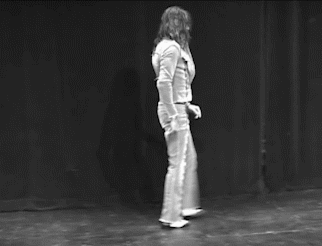
Despite his obvious talents, Cullen flies too close to the sun near the end, which involve extended shootouts between krack-addicted klowns and the bounty hunter hired to kill them. It’s just a confusing pileup of people flopping around on the ground for no reason and firing shotguns one-handedly.
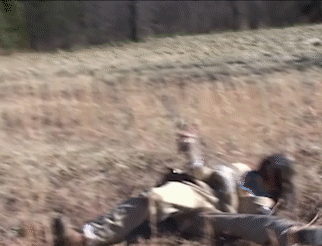
Here he’s clearly trying to make a bad movie, and that’s boring. Anyone can make trash: the secret to a successful bad movie is to make trash without intending to. The Room isn’t funny because of “you’re tearing me apart, Lisa!“, it’s funny because that line was meant to hit emotional paydirt. That critical lack of self-awareness is often missing from Killer Klowns.
My favorite bits are the accidental mistakes. One subplot involves a sleazy cult leader making cold calls and scamming people. But we see his computer screen…and it’s 9:52PM. That one moment – a cold-call marketer drumming up business at two hours before midnight – made me laugh harder than all the deliberately crappy special effects combined.
Cullen’s not famous – yet. The world’s not ready for his genius. One day, when he achieves mass success and is being watched by millions of people, I will be there to bask in the glory, because I believed in him. I have a sneaking suspicion that the “millions of people” will be primetime news viewers and his name will be followed by those of the 20-25 people who were in AR-15 range when he finally snapped, but still.
I highly recommend Killer Klowns. It’s not really an ironic bad movie. It’s more an audiovisual experience for when you don’t want to put any effort into watching a film but still want to experience pixels floating on a screen as your brain shuts down. It’s a 2:00am movie, in other words. I like to stay up late, playing this on repeat. My lower lip hanging slack, drooling. My mind completely blank of any thought. It’s hard to explain, but when I enter this state I almost feel like I’ve achieved a psychic oneness with the people who made it.
No Comments »



